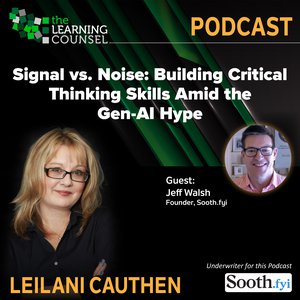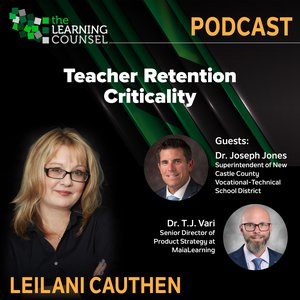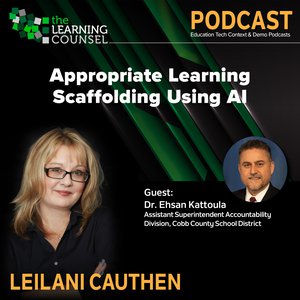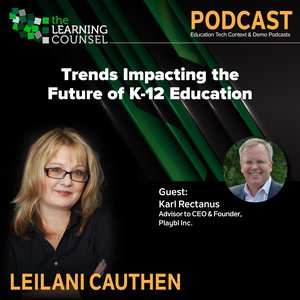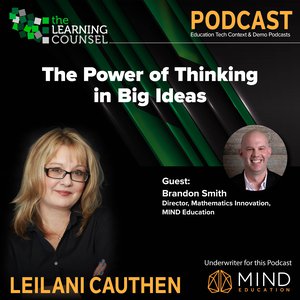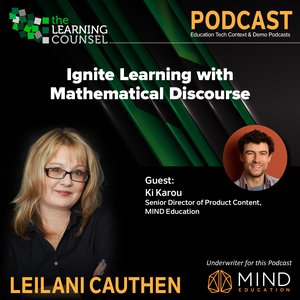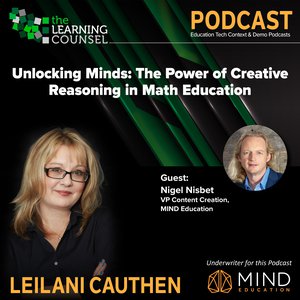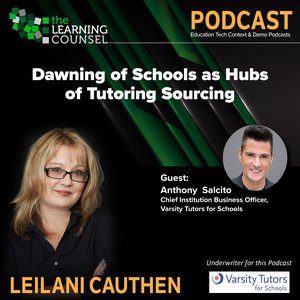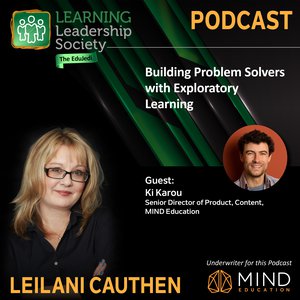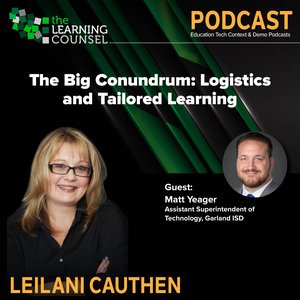
Podcasts with Host LeiLani Cauthen, Author, Researcher and Thought Leader
Topics may include:
Education Legislation Change; Trends Analysis; Balancing AI with Humanities; Schooling Alpha Generation; Future Learning Structures; Any EdTech; UI/UX for Learning; “Science of” Curriculum; Tech Model Architectures; Hybrid Logistics; Networks; Security; Identity and Privacy; Change Management; Strategy Development; Trends; Research; Organizational Planning; Learner Motivation; Experiential or “Expo” Learning; Leadership & Planning
Unique Perspective
“People don’t know what they want until you show it to them. That’s paraphrasing one of Steve Jobs’ famous quotes. Today in education, there are alternatives to traditional public schools that are not necessarily alternative. Yet the mood of society is practically mutiny against traditional schooling in its aspirations for something different, but to what? They don’t know. Certainly, a lot of school leaders think they know, but often the evidence is in their practice that they don’t really see how things should work today in teaching and learning because of tech.
Are we understanding everything we need to about true structural shift away from the industrial age models? Choice is no choice at all if you don’t understand structure and, particularly, the fact that tech changes everything. It’s not the individual devices and bits of software or the teacher’s practice, it’s the sum of the effect, and more interestingly, which technology or logistics or trend reckoning or teaching method is missing and unapplied.
The most important thing is to talk about, to show, the actual future."
Listen in as LeiLani hosts talks with both education and tech company leadership, presenting a unique perspective from her background as a researcher, author, technology developer and strategist.
Signal vs. Noise: Building Critical Thinking Skills Amid the Gen-AI Hype
Imagine saving teachers huge amounts of time because they no longer worry about students engaging low-quality information when researching online. Imagine empowering students’ critical thinking skills and reinvigorating their quest for knowledge in every research assignment. Sound like another hyped Gen-AI promise?
On this podcast, meet Jeff Walsh of Sooth.FYI as he introduces a big new idea and product. LeiLani and Jeff have an eye-opening conversation about the alarming state of our information ecosystem and how it’s actually moving away from the needs of our classrooms. If we want students to build their critical thinking skills, they need access to the vast corpus of credible and diverse sources of insights and information out there – not AI answer engines. If we want to prepare students for the future, they need to realize there are complex sides to any given issue – not black and white facts easily summed up into two opposing sides.
As our digital landscape explodes with ever more content (increasingly created by AI), it’s critical we unburden the work of finding signal within the noise so that teachers and students can get down to the edifying tasks at hand: building critical thinking and fostering the human intellect. Listen to LeiLani and Jeff dive into this critical topic of our time and hear about the novel solution that Sooth.FYI is bringing to classrooms. They discuss AI answer engines, internet search, critical thinking, information literacy, polarization, echo chambers, content paywalls, and much more. Don’t miss it.
Teacher Retention Criticality
Meet authors and educators Dr. Joseph Jones, Superintendent of New Castle County Vocational-Technical School District and Dr. T.J. Vari, Senior Director of Product Strategy at Maia Learning. While on tour for Learning Counsel media, LeiLani met Joseph and T.J. at the regional Baltimore event and learned of their involvement in teacher retention. Between them, they have written six books and are working on another. Listen in on important points made about the state of play in recruiting and retaining teachers during the epic teacher shortage across America from two folks who have been deeply involved in that work along with another author, Salome Thomas-El. Don’t miss their books” Retention for a Change: Motivate, Inspire, and Energize your School Culture,” “Building a Winning Team,” “Passionate Leadership: Creating a Culture of Success in Every School”, “7 Mindshifts for School Leaders: Finding New Ways to Think About Old Problems”, “Candid and Compassionate Feedback: Transforming Everyday Practice in School”, and “Invest in Your Best.”
Appropriate Learning Scaffolding Using AI
Join LeiLani and Dr. Ehsan Kattoula, Assistant Superintendent Accountability Division, Cobb County School District in Georgia for a discussion on “Appropriate Learning Scaffolding Using AI.” Dr. Kattoula makes cogent points on how AI will need to be used in schools, what it’s worth will be to learning, and what he means by “scaffolding” learning. Kattoula’s long-time work as an educator and data scientist helping direct this large district’s student management with data has been some of the most forward-thinking in America. His points are well worth the listen.
Trends Impacting the Future of K-12 Education
LeiLani embarks on a discussion with her friend Karl Rectanus, an edtech entrepreneur and former educator with a history of great innovations in the K12 marketspace. Together they bring up what’s at the top of trends and dynamics in K12, starting with what’s happening with AI. Karl’s perspective on what will happen, what’s new and what educators should pay attention to makes for a refreshing listen.
The Power of Thinking in Big Ideas
States like California and Georgia are working on curriculum frameworks that include incorporation of mathematical “Big Ideas.” What are they? Listen in on this podcast with LeiLani and Brandon Smith, the Lead Mathematician and Product Director at MIND Education. The discussion opens about the possibility that mathematics education has been trying to solve the wrong problem in learning, how learning is built, not transferred, and providing insight into the new direction of teaching and learning that could be the watershed moment long hoped for to drive higher achievement. (Audio only and Video version available)
Ignite Learning with Mathematical Discourse
More teachers should understand that loss of engagement in the present generation of students has serious neuroscience-driven experts hot on the trail of tech solutions that curiously elevate human discourse at the same time. LeiLani interviews Senior Director of Product and Content for MIND Education, Ki Karou, who leads a team of learning and game designers, artists and mathematicians who develop ST Math’s interactive programs. They discuss the importance of talking about math and collective problem solving in classrooms, how this transforms the actual learning experience while engaging students. Listen in as LeiLani and Ki chat about how students chatting about what they notice and what they wonder about in math problems presented as puzzles prompts the learning engagement needed. (Audio only and Video version)
Unlocking Minds: The Power of Creative Reasoning in Math Education
Nigel Nisbet, VP of Content Creation at MIND Education joins LeiLani to discuss creative reasoning in the process of learning math. Imagine a mind being able to internally visualize math in a similar way to any other language – such as the mental image picture one gets of a tall tree in all it’s dimension on a landscape and its color and movement in the wind. Such a mind exploring math would have achieved much more than memorizing addition and subtraction tables, for example. This evolution of math learning is particularly important for educators to understand and for learners to have facilitated to arrive at the type of learning that uses curiosity over anxiety, and imagination over arduous mechanics. Nigel and LeiLani elaborate on what’s changed about the world that makes this podcast a must view or listen.
Dawning of Schools as Hubs of Tutoring Sourcing
What does it mean to school leaders and teachers to intersect students with what they need to achieve when the existing schedule already overwhelms teachers? When there is no time to catch students up or challenge ones far ahead, something must be done or the likelihood of losing those students to alternatives or dropping out is high. The dawning of change in the structure of schooling includes novel approaches to sourcing tutoring to overcome learning loss, absenteeism, behavioral issues, and expectations of full personalization for every learner. It used to be that easy scheduling was a difficult proposition – but no longer so with AI. In this discussion with Anthony Salcito, Chief Institution Business Officer with Varsity Tutors, Leilani learns about Varsity Tutors and their mission to help schools gain, without compromise, on their objectives by becoming a sourcing hub leveraging some 40,000+ tutors.
Building Problem Solvers with Exploratory Learning
Listen in as LeiLani discusses with guest Ki Karou of MIND Education what it means to use game-based learning, visual learning, in helping learners build mental schema and problem-solve. This is a complex topic that Karou is an expert in, being the Lead Mathematician and Product Director at MIND Education. Karou’s application of game theory and rich background in cognitive sciences makes for an excellent conversation on what edtech is doing today to drive true personalization with exploratory learning.
The Big Conundrum: Logistics and Tailored Learning
A conundrum of schools wanting to personalize and customize learning, to tailor it around individuals is juxtaposed against a lack of logistics and strategy in this discussion with Matt Yeager, Assistant Superintendent of Technology from Garland Independent School District in the Dallas, Texas area with 52,000 students. Yeager introduces his theory of leadership and answers questions about what he means by tailored learning, missing logistics and his work in connectivity for schools and students. He provides additional valuable insights in strategic planning and how schools need to understand how technology will help them change structure and gain long-held desires to provide what learners and parents really want. (Audio only and video versions)

